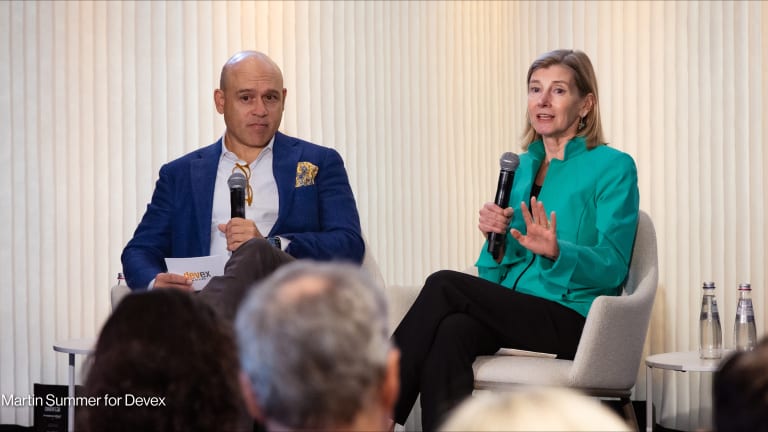
NEW YORK — COVID-19 is weakening social, educational, and health services access for women and girls. But the crisis also provides an opportunity to dismantle traditional development funding structures, and create a more equitable system that reaches more women, especially women of color, according to female development leaders.
Prioritizing longer-term and core funding, connecting directly with grassroots organizations, and learning from the work of feminist development organizations could all help women of color in development have more impact, Latanya Mapp Frett, president and CEO at the Global Fund for Women, explained to Devex.
The Black Lives Matter movement has spurred many development organizations to examine internal systems contributing to structural racism. But work to establish more diverse leadership, for example, has edged ahead of rethinking funding strategies, according to Mapp Frett. Women leaders of color continue to receive disproportionately low amounts of funding from major international donors, she said.
“It is almost like ‘Fait accompli, we have done it, we have gotten it right. We got a leader of color who looks like the communities the organization is addressing.’ What we find is that the amount of money [women of color] get still tends to be much smaller,” Mapp Frett said in a recent interview.
A lack of a strong preexisting relationship with major donors is among the factors that can make it harder for women of color to receive development funding, according to Mapp Frett.
“Because the relationship is new, because the trust is not well founded or well placed, so you would rather write a check that is much smaller to see how that goes, despite historical records of safe utilization of funds, and incredibly impressive backgrounds of these leaders that are running the organizations,” Mapp Frett said.
A shadow pandemic
The pandemic has had specific impacts on women, from a sharp rise in domestic violence to an increase in unpaid care work. U.N. Secretary-General António Guterres has appealed to governments to prioritize women in their COVID-19 response plans, including placing women in leadership positions during the recovery.
Without properly addressing the “shadow pandemic” of violence against women and girls, gender equality progress over the last several decades could backtrack, Guterres has said.
Ensuring that development financing directly reaches women of color is one way to help avoid this backsliding of progress, Jennifer Okwudili, interim deputy director at the Bill & Melinda Gates Foundation, said during a webinar on donors and movements, hosted by Women in Development last week.
“Yes, there is this shadow pandemic, but it is about to come out of the shadow, if we do not use this moment to critically rethink the role of women in development, and how we think about cash transfers, how we think about rebuilding better, so it is not an add-on to think about women but core and central from the beginning,” Okwudili explained during the webinar.
Less than 1% of foundation giving directly reaches women of color implementing development work. And an Echoing Green study of their applicants in May also showed that, on average, revenues of Black-led organizations are 24% smaller than the revenues of their white-led counterparts, and Black women in their grant portfolio consistently receive less funding than Black men and white women.
Movement-led capacity 2.0.
Mapp Frett was among the panel experts on the women in development webinar who offered specific ideas for donors directly supporting women of color. Donors should give WOC-led organizations more core funding, not “dictating to them how it has to be used,” Mapp Frett later explained to Devex. Longer-term funding is also necessary to ensure impact.
“If every dollar you get is tied in to some specific metric, it cannot thrive. Funding has to be flexible, it has to be core funding, it has to be put in a larger pot that helps people pay the rent,” Mapp Frett said.
“It is almost like ‘... We have done it. ... We got a leader of color who looks like the communities the organization is addressing.’ What we find is that the amount of money [women of color] get still tends to be much smaller.”
— Latanya Mapp Frett, president and CEO at Global Fund for WomenA complicated donor application process is another structural challenge facing some women of color leading grassroots organizations, which often find secure, long-term financing “inaccessible,” according to Uma Mishra Newbery, program director of Women’s March Global.
“Those power dynamics include donors and funders setting the agenda and defining what success looks like, which leaves such a minute amount of room for movements to actually do the work … that is so critically needed,” Mishra Newbery said.
Global Fund for Women is in the process of reworking its funding strategy, as part of an effort that Mapp Frett calls “movement-led capacity 2.0.” The new strategy will involve convening women-led movements, linked by either geography or thematic area of work, in a participatory funding model, Mapp Frett explained.
“If you can manage getting all the players in a particular movement at the table, and from that having the ability to sort out a number of strategic partnerships and dollars, the people can then decide how they want to utilize that funding, and not just send some application that comes to San Francisco,” Mapp Frett continued.
And it means that the Global Fund for Women will task themselves with finding grant recipients, not the other way around.
“Instead of insisting organizations around the world, particularly from the global south, have to reach out to find money and do this exhaustive search, what if we had funds like the Global Fund for Women looking for them?” Mapp Frett said.
The Gates Foundation is also reevaluating its grant-making process, changing investment workflow to focus more on outcome investments, Okwudili explained. One part of this work involves focusing on outcomes “from the onset,” when collaborating with prospective partners.
“The most important thing is managing for results and not activities. I think it is really easy to look at the trees and not the forest, and that is something that is innate in human nature, to just be so focused on making progress that you are missing the broader set of outcomes we should be focused on,” Okwudili said.
Mapp Frett offered a piece of advice for international NGOs and donors that might be rethinking their own funding strategies: Don’t recreate the wheel, she said.
“There are so many organizations, and I see it over and over again, that say, ‘We are going to create a program for women leaders in tech, and we are going to bring these women over to Silicon Valley from around the world and give them training,’” Mapp Frett said.
“My response to that is, ‘Do a little more work, look at organizations like Global Fund for Women, to see what is already happening, what has the most impact, and where the needs are.”








